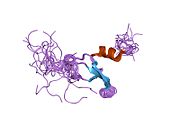CBX8
Appearance
(Redirected from CBX8 (gene))
Chromobox protein homolog 8 is a protein that in humans is encoded by the CBX8 gene.[5][6]
Interactions
[edit]CBX8 has been shown to interact with RING1[7] and MLLT1.[8]
References
[edit]- ^ a b c GRCh38: Ensembl release 89: ENSG00000141570 – Ensembl, May 2017
- ^ a b c GRCm38: Ensembl release 89: ENSMUSG00000025578 – Ensembl, May 2017
- ^ "Human PubMed Reference:". National Center for Biotechnology Information, U.S. National Library of Medicine.
- ^ "Mouse PubMed Reference:". National Center for Biotechnology Information, U.S. National Library of Medicine.
- ^ Bardos JI, Saurin AJ, Tissot C, Duprez E, Freemont PS (Oct 2000). "HPC3 is a new human polycomb orthologue that interacts and associates with RING1 and Bmi1 and has transcriptional repression properties". J Biol Chem. 275 (37): 28785–92. doi:10.1074/jbc.M001835200. PMID 10825164.
- ^ "Entrez Gene: CBX8 chromobox homolog 8 (Pc class homolog, Drosophila)".
- ^ Bárdos JI, Saurin A J, Tissot C, Duprez E, Freemont P S (Sep 2000). "HPC3 is a new human polycomb orthologue that interacts and associates with RING1 and Bmi1 and has transcriptional repression properties". J. Biol. Chem. 275 (37): 28785–92. doi:10.1074/jbc.M001835200. ISSN 0021-9258. PMID 10825164.
- ^ García-Cuéllar MP, Zilles O, Schreiner S A, Birke M, Winkler T H, Slany R K (Jan 2001). "The ENL moiety of the childhood leukemia-associated MLL-ENL oncoprotein recruits human Polycomb 3". Oncogene. 20 (4): 411–9. doi:10.1038/sj.onc.1204108. ISSN 0950-9232. PMID 11313972.
External links
[edit]- Human CBX8 genome location and CBX8 gene details page in the UCSC Genome Browser.
Further reading
[edit]- García-Cuéllar MP, Zilles O, Schreiner SA, et al. (2001). "The ENL moiety of the childhood leukemia-associated MLL-ENL oncoprotein recruits human Polycomb 3". Oncogene. 20 (4): 411–9. doi:10.1038/sj.onc.1204108. PMID 11313972.
- Hemenway CS, de Erkenez AC, Gould GC (2001). "The polycomb protein MPc3 interacts with AF9, an MLL fusion partner in t(9;11)(p22;q23) acute leukemias". Oncogene. 20 (29): 3798–805. doi:10.1038/sj.onc.1204478. PMID 11439343. S2CID 25138105.
- Levine SS, Weiss A, Erdjument-Bromage H, et al. (2002). "The core of the polycomb repressive complex is compositionally and functionally conserved in flies and humans". Mol. Cell. Biol. 22 (17): 6070–8. doi:10.1128/MCB.22.17.6070-6078.2002. PMC 134016. PMID 12167701.
- Strausberg RL, Feingold EA, Grouse LH, et al. (2003). "Generation and initial analysis of more than 15,000 full-length human and mouse cDNA sequences". Proc. Natl. Acad. Sci. U.S.A. 99 (26): 16899–903. Bibcode:2002PNAS...9916899M. doi:10.1073/pnas.242603899. PMC 139241. PMID 12477932.
- Ota T, Suzuki Y, Nishikawa T, et al. (2004). "Complete sequencing and characterization of 21,243 full-length human cDNAs". Nat. Genet. 36 (1): 40–5. doi:10.1038/ng1285. PMID 14702039.
- Obuse C, Yang H, Nozaki N, et al. (2004). "Proteomics analysis of the centromere complex from HeLa interphase cells: UV-damaged DNA binding protein 1 (DDB-1) is a component of the CEN-complex, while BMI-1 is transiently co-localized with the centromeric region in interphase". Genes Cells. 9 (2): 105–20. doi:10.1111/j.1365-2443.2004.00705.x. PMID 15009096. S2CID 21813024.
- Gerhard DS, Wagner L, Feingold EA, et al. (2004). "The status, quality, and expansion of the NIH full-length cDNA project: the Mammalian Gene Collection (MGC)". Genome Res. 14 (10B): 2121–7. doi:10.1101/gr.2596504. PMC 528928. PMID 15489334.
- Stelzl U, Worm U, Lalowski M, et al. (2005). "A human protein-protein interaction network: a resource for annotating the proteome". Cell. 122 (6): 957–68. doi:10.1016/j.cell.2005.08.029. hdl:11858/00-001M-0000-0010-8592-0. PMID 16169070.
- Dietrich N, Bracken AP, Trinh E, et al. (2007). "Bypass of senescence by the polycomb group protein CBX8 through direct binding to the INK4A-ARF locus". EMBO J. 26 (6): 1637–48. doi:10.1038/sj.emboj.7601632. PMC 1829390. PMID 17332741.







